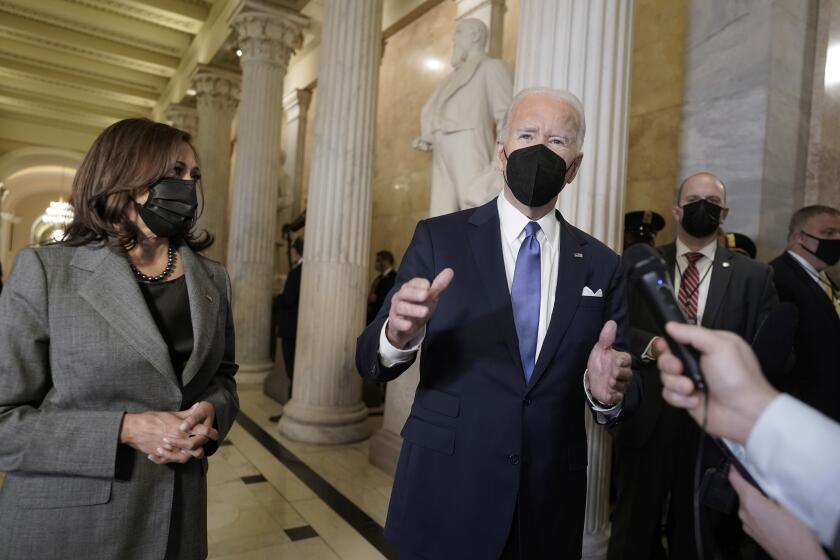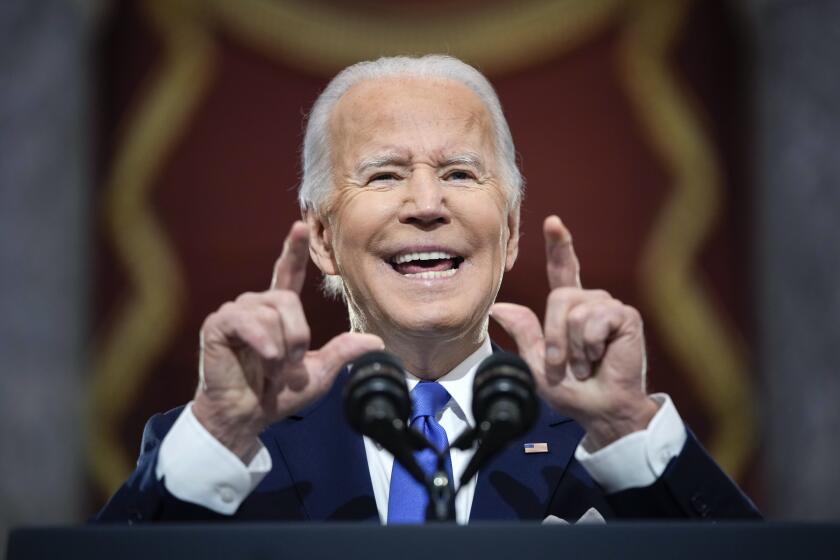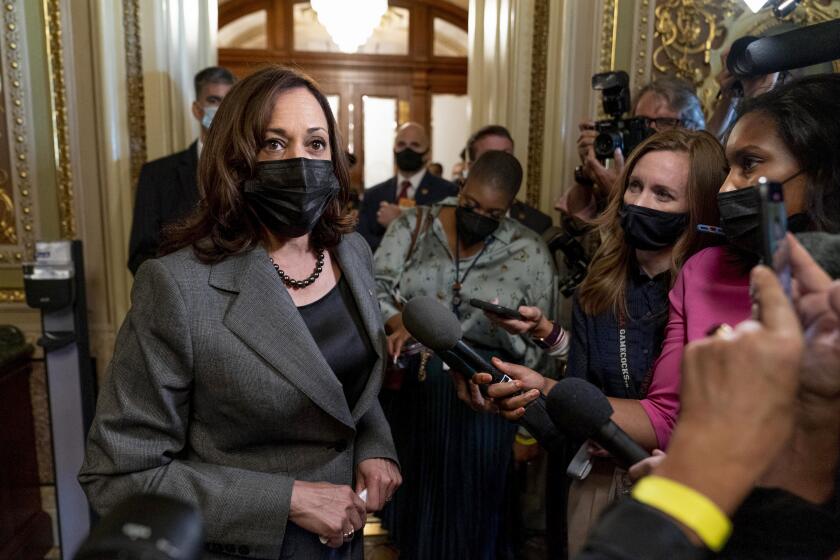News Analysis: Biden is stuck with a divided party

- Share via
WASHINGTON — Among President Biden’s most valuable political skills has been a knack for planting himself firmly at the ideological center of the Democratic Party, a trait that helped him win elections amid shifting winds over five decades in public life. In office, that strategy enabled him to cobble together enough lawmakers to pass a large economic relief package and a bipartisan infrastructure bill.
But as he begins his second year, battling a relentless pandemic while navigating the limits of the narrowest of congressional majorities, he has struggled to follow that familiar path for the rest of his legislative agenda.
The desires of the Democratic center — transformational spending on social programs, tackling climate change and combating Republican efforts to limit voting — are not shared by all Democrats in the Senate. Without 100% agreement in the evenly split chamber, Biden cannot accomplish anything, given Republicans’ refusal to cooperate.
That disagreement and tiny margins for error have left Biden pivoting from a losing battle over a $1.8-trillion spending plan to another futile confrontation over a voting rights bill that died in the Senate on Wednesday.
Biden, who prides himself on reading Congress, knew his voting rights push was unlikely to succeed, with at least two Democratic senators and the full Republican caucus on record opposing changes to the arcane Senate filibuster rules. He warned in a CNN town hall in October that the battle over the rules could distract and imperil his economic and foreign policy agendas.
News Analysis: ‘There is no Plan B’: Biden trading one challenge for another with voting rights push
After failing to push through his social spending bill, President Biden turns to voting rights legislation, a pivot advocates say is long overdue.
Yet this month he felt he had no choice but to plunge ahead in the face of pressure from activists and other members of his party who say that democracy is on the line. They argue that Republican-led states are aggressively remaking election rules that restrict voting access, a campaign fueled in part by former President Trump’s false claims that the 2020 election was stolen.
Black voters, the core of the party’s base, have been particularly passionate advocates in seeking to override such state laws with federal legislation. Civil rights groups have spent the last year asserting that GOP measures — especially in places such as Georgia that have a long history of racial discrimination when it comes to voting — are likely to disproportionately affect voters of color. Many complained loudly that Vice President Kamala Harris, the first Black woman to hold national office, was given the task of leading the effort but without the authority to negotiate in the Senate or make the strategic decision on whether to push for a change in the rules.
“You think it’s bad for him to stick his neck out and lose a vote on voting rights? Well, it is f— untenable for him not to have done it,” said Cornell Belcher, a pollster who specializes in African American outreach. “Shrugging his shoulders and saying, ‘Well, I can’t win so I won’t try’ — that would have been disastrous for him.”
Republicans, who have obstructed Biden at almost every turn, are reveling at his paralysis.
“It is a little mind-boggling,” said Josh Holmes, a former chief of staff to Senate Republican leader Mitch McConnell of Kentucky. “I can’t imagine a scenario where you’re trying to distract the American public from a legislative failure by embarking on another one that is certain to fail.”
They see Biden’s move as an attempt to hang on to the party’s most partisan voters in the November midterm elections and a concession that he has no chance with pivotal independents who care more about the economy and the pandemic.
President Biden’s first year is dominated by tension between his vow to return the U.S. to normal and the reality that Trump changed it profoundly.
Even some who share Biden’s goals question the tactics. Richard L. Hasen, a voting rights expert at UC Irvine’s law school, said Biden should have worked on more narrow legislation designed to avert Trump’s attempts to subvert the counting and certifying of the electoral college vote. That issue, especially after the Jan. 6, 2021, insurrection, had attracted at least some Republican support. Hasen said Biden should have jumped at that opening.
“I’ve been mystified for months why Democrats continued to raise the stakes when it was clear that they were not going to get the buy-in from” Sens. Joe Manchin III (D-W.Va.) and Kyrsten Sinema (D-Ariz.), he said. “Maybe they thought the public pressure would make a difference, but I don’t understand the strategy.”
Biden acknowledged Wednesday that he didn’t call many Republicans to negotiate on vote-counting legislation, arguing that he was first “trying to make sure we got everybody on the same page, in my party, on this score.”
Sinema and Manchin have both hung on to the belief that the Senate can return to an era of bipartisan cooperation despite recent evidence to the contrary. Though the two support Democrats’ voting rights bills, they have both refused to change the filibuster rules, leaving Democrats short of the 60 votes needed to pass a bill. Republicans, who once supported voting rights bills as a matter of routine, have rejected Manchin’s overtures for a compromise.
Manchin has little political incentive to give Biden any more victories beyond his votes on a bipartisan infrastructure deal and approval of his nominees. West Virginia voted overwhelmingly for Trump in 2020. Manchin has defied his state’s strong Republican tilt by defining himself as a thorn in side of the Democratic Party. An angry chorus of Democratic activists arguably helps his stature at home.
While Biden held a major year-end news conference Wednesday, trying to project optimism about the progress he has made, Manchin was on the Senate floor speaking about his opposition to changing the filibuster. Manchin and Sinema voted hours later against changing the 60-vote threshold into a so-called talking filibuster, which would allow members to speak twice for as long as they want before a simple majority vote on final passage.
“I respect that you have changed your position on this,” Manchin said. “I hope that you would respect that I have not and I have never wavered on this.”
Ruy Teixeira, a senior fellow and demographics researcher at the left-leaning Center for American Progress, compared Democrats’ efforts to persuade Manchin and Sinema to Americans who go to a foreign country and compensate for their lack of language skills by shouting loudly in English.
“They turned the volume up to 11 on how, if they don’t do this, American democracy will die. ‘You’re on the side of Bull Connor or Jefferson Davis,’” Teixeira said. “They’ve just got to wake up and smell the coffee, that this doesn’t work. It just doesn’t.”
Many Democrats disagree with that line of thinking, believing this was a fight worth having regardless of politics, given the fundamental importance of voting.
“A big question here is: Are we going to have elections past 2024? Are we going to have democracy?” said Brian Stryker, a Democratic pollster who has otherwise warned his party to beef up its economic message.
The lack of movement on voting has stymied the Biden administration on an issue that many Democrats and elections experts feel is fundamental.
But now Biden has to find a way to move on. Barring early retirements, deaths or party switches, he has just a year left to govern with his current narrow majorities in Congress. If history holds, his party will lose power in at least one congressional chamber in November, giving him even less leverage in the final two years of his term.
In the meantime, he might win a few other legislative victories before January 2023 by focusing on less heralded bills targeting the supply chain and competition with China. And there is a chance he can garner 10 Republican votes for legislation protecting the presidential vote-counting process.
He said at Wednesday’s news conference that he would pursue the vote-counting legislation along with “big chunks” of his spending bill, including money for early education, energy and the environment.
“I’m a mainstream Democrat and I have been,” Biden said. “If you notice, 48 of the 50 Democrats supported me in the Senate on virtually everything I’ve asked.”
But if he and those 48 lawmakers want to pass anything else, they will have to accept what Manchin and Sinema are willing to give him.
Times staff writers David Lauter and Eli Stokols contributed to this report.
More to Read
Get the L.A. Times Politics newsletter
Deeply reported insights into legislation, politics and policy from Sacramento, Washington and beyond. In your inbox three times per week.
You may occasionally receive promotional content from the Los Angeles Times.














